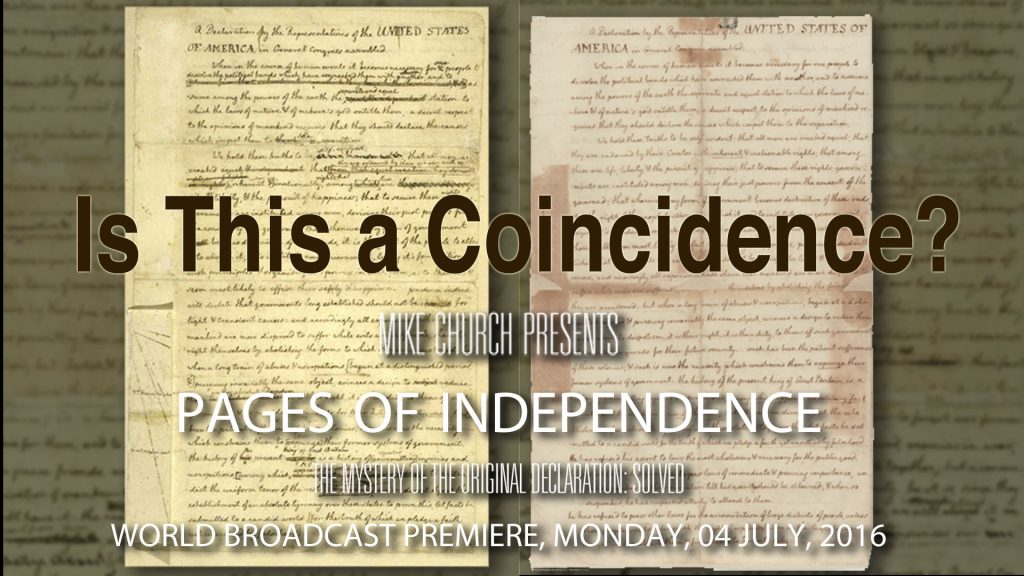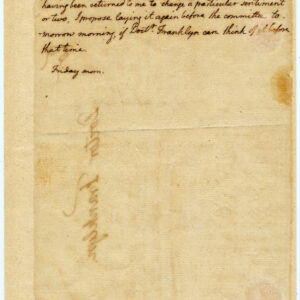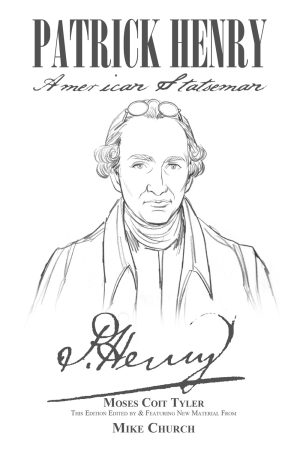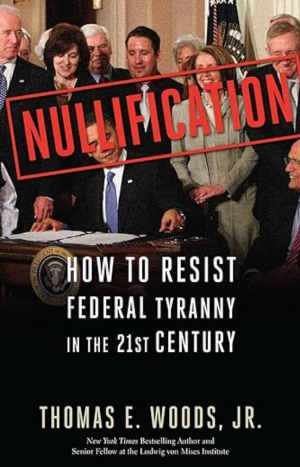Description
NOTE BENE: Below is a compleat history of the development of my epic, 3 year long research and discovery project that culminated in the final, theatrical release of Pages of Independence-The Search For Jefferson’s Original, now available as a digital download for the first time ever!
Mandeville, LA – Recall at this time [July 1776] that Jefferson and company were acutely aware they were wanted by the British Army and that if captured the “fortune” part of their pledge would mean confiscation of their papers and effects. Thus my contention that George Wythe did indeed receive a very special copy of THE Declaration of Independence becomes more likely as the exploration of the subject continues. The “Original” Declaration copy on display at the National Archives is therefore-A Fake – Mike Church, 11 June, 2015
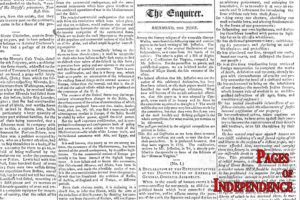
–Preview of the Prologue of Pages Of Independence. The story starts innocently enough, but Madison doesn’t know about the Mystery of the Missing Original!
– How do you get 42,000 bullets out of the Declaration? Ask King George III
-Meet the man who inspired our story, Professor Wilfred Ritz.
-Washington receives important news from Congress-The Declaration!
-15 June, 1775, The crux of our investigation is s centered on the Secrecy Oath & Rules of The Continental Congress
11 June, 2015 – If THE handwritten copy of THE Declaration of Independence, prepared by Thomas Jefferson shortly after the vote for Independence were still in existence, it would be one of the most priceless historical artifacts in world history. On Friday, 03 July, 2015, Mike Church will present conclusive, historical evidence that this artifact DOES indeed exist, is in relatively good condition and its location is known!
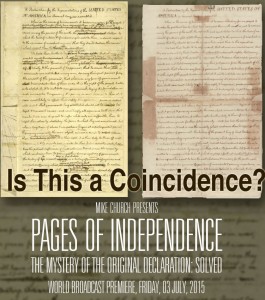 SECONDLY – If it were proven that there were printed copies of Jefferson’s Draft prepared for each member of Congress BEFORE the legendary and near priceless Dunlap Broadsides were produced, that would be the second biggest priceless archive in American history. On Friday, 03 July, 2015, Mike Church will present compelling, historical evidence that this is the case and that documents location is known as well.
SECONDLY – If it were proven that there were printed copies of Jefferson’s Draft prepared for each member of Congress BEFORE the legendary and near priceless Dunlap Broadsides were produced, that would be the second biggest priceless archive in American history. On Friday, 03 July, 2015, Mike Church will present compelling, historical evidence that this is the case and that documents location is known as well.
Pages of Independence is an exciting, historical whodunit that unravels the mysteries wound up in the making of the Declaration of Independence. This is not the stuff of Hollywood, historical farce but is equally entertaining and…just happens to be true. If you thought you know the real story behind the sequence of events that produced the world’s most famous document, you are about to forget most of what you know!
August 10, 2014 – When Mike Church’s “Ages of Independence” made its world broadcast premiere on Friday, 04 July, 2014, one of the most confounding mysteries of American History begins to unravel: What happened to the Original Declaration of Independence, debated in Congress beginning 01 July, 1776? Historians have wrongly concluded that there is no surviving copy of WHAT Congress was debating on those 4 fateful days.
Ages of Independence-The Movie will unravel that mystery and for the first time reveal the precise location of Jefferson’s handwritten and corrected draft. This thrilling story is made possible by using the work of professor Wilfred Ritz of Washington and Lee University who reached a similar, ignored conclusion in 1992 but did not have the use of the research tools available in the internet age.
Ages of Independence will walk listeners through this process as only master story teller Mike Church (Times That Try Men’s Souls, Spirit of ’76) can.
==============UPDATES FOLLOW============
04 August, 2014 – My research and development of the script and final form of this feature continue to expand in new and exciting ways. Today’s update has an avalanche of new information that I will tie together in the feature.
1. The NY Public Library currently holds what they believe to be A copy of the Declaration, in Jefferson’s hand, sent to George Wythe, but they CANNOT prove it. But I say, that they can, indeed and WILL prove it on July 3rd, 2015 on SirusXM. I will present solid, historical evidence that Wythe did have a copy and that copy was transmitted to Jefferson as promised in 1776.
2. The copy attributed to have been sent to RH Lee by Jefferson on 06 July, 1776 is owned by the American Philosophical Society but there is a serious problem with that. RH Lee’s son is counted upon as verifying the extant, 1776 copy as belonging to his father and in their possession continuously, yet in 1805 Timothy Pickering claims to have VIEWED the Lee copy while in Washington, D.C.. How can that be if it was in the hands of RH Lee Jr in Albemarle VA? APS also claims that “Arthur Lee” added annotations of the edits Congress made to the 1776 Lee copy but there was no Arthur Lee in attendance in Philadelphia and R.H. Lee wouldn’t return there ’til the end of August. Who then marked up the Lee copy and where are the other 3 pages (the APS only displays 1 page and does not list the artifact in it’s online museum collection.) An artifact that isn’t seen to confirm existence isn’t an artifact.
3. Why would Wythe leave all his “personal…papers and works of philosophy” to Jefferson in his last will and testament? Easy answer, to fulfill the promise of safeguarding the Original Declaration for its owner and transmitting it to him safely, without notice.
4. Jefferson admitted that he had the fabled document in 1825 writing to a Mr Vaughan who was seeking the “Original”. “I have it in my hands…whether it be the original is a matter of definition”. Historians have concluded he was referring to the “Rough Draught” copy that now belongs to the National Archives. It is clear in the Vaughn letter, there are TWO documents being discussed. How could this have been overlooked!? Read the letter for yourself and note the thinly veiled allusion to leaving the Original to the UVA (which he did) as an “irresistable claim”.
“Dear Sir Monticello Sep. 16. 25
I am not able to give you any particular account of the paper handed you by mr Lee, as being either the original, or a copy of the declaration of Independence, sent by myself to his grand father. the draught when compleated by myself, with a few verbal amendments, by Dr Franklin and mr Adams, two members of the Committee, in their own hand writing, is now in my own possession, and a fair copy of this was reported to the Committee, past by them without amendment, and then reported to congress. this paper should be among the records of the old Congress; and whether this, or the one from which it was copied, and now in my hands, is to be called the Original is a question of definition. To that in my hands, if worth preserving, my relations with our University gives irresistable claims. whenever, in the course of the composition, a copy became overcharged, and difficult to be read with amendments, I copied it fair, and when that also was crouded with other amendments, another fair copy was made Etc. These rough draughts I sent to distant friends who were anxious to know what was passing. but how many, and to whom, I do not recollect. one sent to Mazzei was given by him to the countess de Tessé (aunt of Mde de la Fayette) as the original, & is probably now in the hands of her family. whether the paper sent to R. H. Lee. was one of these, or whether, after the passage of the instrument, I made a copy for him, with the amendments of Congress, may, I think be known from the face of the paper. the documents mr Lee has given you must be of great value, and until all these private hoards are made public, the real history of the revolution will not be known.
10 July, 2014 – I have previously demonstrated in Founding Father Films’ latest feature “Ages of Independence” that there must have been a leak of printed drafts of the Declaration of Independence. This is a previously unreported historical fact that only the late Professor Wilfred Ritz of Washington and Lee ever bothered to explore. Today I present evidence of this from the journal of the Continental Congress, RE-introducing these (as a reminder) previously introduced and sworn-oaths-to by Members, secrecy rules. What else could be the purpose other than to dissuade the conduct just experienced over leaked copies of the PRINTED draft of the Declaration of Independence?
The timing of these reminders is no coincidence because these rules FOLLOWED the introduction of the Articles of Confederation, the second most important document of the Continental Congress era. Note the wording of the rules and the explicit nature of what is to be done with materials used to produce DRAFT COPIES. (comments from Mike Church are in parentheses emphasis in bold from Mike Church)
Resolved, That eighty copies, and no more, of the confederation, as brought in by the committee, be immediately printed, and deposited with the secretary, who shall deliver one copy to each member: (why would Congress distribute copies of the Articles unless this was procedure for debating lengthy resolutions and acts and simply unrecorded in the Secret Journal during the hectic debate over Independence?)
That a committee of (—) be appointed to superintend the press, who shall take care that the foregoing resolution [unfinished] (what is “unfinished”? it is likely that, to spare the culprits history’s shame, a lengthy discussion of the leaked draft copies and lack of integrity in the printing process was engaged but left off the journal)
That the printer be under oath to deliver all the copies, which he shall print, together with the copy sheet, to the secretary, and not to disclose either directly or indirectly, the contents of the said confederation: (why bother with this extreme security measure if there wasn’t a reason to believe that printers NOW needed to take secrecy vows like delegates?)
That no member furnish any person with his copy, or take any steps by which the said confederation may be re-printed, and that the secretary be under the like injunction. (again, this would only be necessary if recent events made it so. The delegates had already sworn this same oath)
09 July, 2014 – I told the radio audience I had not COMPLETED the task set out for in Ages but had just started it. Today I began the process of tracking down the correspondence between George Wythe and Jefferson c. July 1776 and it only deepens the intrigue! We know that Wythe received a handwritten, edited copy of the Declaration posted on 05 July, but Jefferson’s letter of that date makes no mention of it whatever and thus makes no sense UNLESS, he was writing in cypher.
circa 05 July, 1776, Thomas Jefferson writes this letter to VA Patriot George Wythe. This is the only communication to Wythe that month and I believe part of this letter was intended as a secret and was destroyed as I explain later.
“The dignity and stability of government in all its branches, the morals of the people, and every blessing of society, depend so much upon an upright and skillful administration of justice, that the judicial power ought to be distinct from both the legislature and executive, and independent upon both, that so it may be a check upon both, as both should be checks upon that. The judges, therefore, should always be men of learning and experience in the laws, of exemplary morals, great patience, calmness and attention; their minds should not be distracted with jarring interests; they should not be dependent upon any man or body of men. To these ends they should hold estates for life in their offices, or, in other words, their commissions should be during good behavior, and their salaries ascertained and established by law.
For misbehavior, the grand inquest of the colony, the house of representatives, should impeach them before the governor and council, when they should have time and opportunity to make their defence; but if convicted, should be removed from their offices, and subjected to such other punishment as shall be thought proper.”
Most have assumed Jefferson was offering changes to the VA Constitution but that makes no sense because Jefferson knew that the Constitution had been ratified and that Patrick Henry had already been elected governor. Also, in his letter to RH Lee, two days later, Jefferson explained the Declaration copy he was sending .
“Dear Sir,
—For news, I refer you to your brother, who writes on that head. I enclose a copy of the Declaration of Independence, as agreed to by the House, and also as originally framed: you will judge whether it is the better of worse for the critics.”
Why is there no mention at all in the letter to Wythe of THE Declaration of Independence? Wythe’s response to Jefferson might make some sense if we are operating under the premise that Jefferson had sent THE Original copy of his Draft, the one ordered to “Lie on the table” to Wythe for safekeeping.
“Lord Dunmore, driven from Gwins, retreated to St. George’s island in Potowomack, a station we hear he found no less unquiet than what he left, so that he hath gone up that river, distressed, it is imagined for want of water. Ought the precept, ‘if thine enemy thirst give him a drink,’ [edited for brevity] …. In October I hope you will effect it. I have directed a carriage to meet me at Hooe’s Ferry the third of September. So soon as I saw Mr. Bruce I mentioned the copies you wanted. He told me he could not find some of the papers. I propose in a day or two to assist him in searching for them, and will desire him to get them ready by the time you will be in Virginia.
Farewell.
Williamsburg, 27 July, 1776″
We just read what is alleged to be TJ’s letter of 5 July that made NO MENTION of “copies” of any sort. There are no other communications between the two that have survived so we can deduce that what Wythe left for his heirs to find upon his death was incomplete and that upon receiving THE Declaration from Jefferson, he honored TJ’s secrecy vow and destroyed the instructive parts of the letter i.e. WHAT is to be “copied”. To complicate the matter and deepen the mystery further, consider the introduction of this mysterious character to our story “Mr. Bruce”. What “papers” are they getting ready for Jefferson on his return and who is this “Mr. Bruce” character? Virginia patriot Landon Carter helps unravel this mystery a bit, writing in his diary on the 4th of July, 1776.
“Yesterday brought me from Jos. Harwood £30 for my horse Nimrod; one 12 pound one 10 pound and one 8 pound note, James River bank. I hope I am not deceived when I say that this Mr. Bruce seems to be an honest and, in this instance of the American struggle, not what the diagnosis of Toryism would call a moderate man: for he seems to be quite hearty in the cause although a Scotchman; I have had much conversation with him detesting the behaviour of his countryman, in particular a late runegado to Govr. Eden and Dunmore, who carried off all the slaves and servants almost out of Maryland.”
It would follow that someone “hearty in the cause” could be entrusted with doing some kind of search, perhaps for proper parchment, to have printed copies of Jefferson’s work made in case the existing hand written drafts fell into the wrong hands. Recall at this time that Jefferson and company were acutely aware they were wanted by the British Army and that if captured the “fortune” part of their pledge would mean confiscation of their papers and effects. Thus my contention that George Wythe did indeed receive a very special copy of THE Declaration of Independence becomes more likely as the exploration of the subject continues. Stay tuned… – Mike Church
“OVER the past two centuries many legends, myths, misconceptions, and palpable error have clustered about the Declaration of Independence… All of them, including the signed and engrossed copy, share in common the fact that they are derivatives of the prototype which was adopted by Congress on the evening of July 4, 1776, and which unhappily disappeared from history almost at the moment of its creation.“ – Historian Julian Boyd, commissioned to write “The Mystery of The Lost Original” by the 1976 bi-centennial Commission. THIS docudrama “Ages of Independence” believes Boyd’s summary is incorrect and Mike Church’s audio feature proves it.
Here are some sneak previews from Ages of Independence. The Full feature will be streaming live for Founders Pass Members Only, all Independence Day and weekend, right here via Founding Father Films Radio. Not a member of the Founders Pass yet? Founders Pass members helped fund the research that goes into making features like “Ages of Independence” possible and costs .17 cents per day AND gives you a full-time, 15% discount to Mike Church’s Founders Tradin’ Post Store, containing ALL of Mike’s written, recorded and filmed works, plus Mike’s cigars, t-shirts and much more. Sign up today so you will never miss a LIVE stream event or digital media file product like Stonewall Jackson-The Illustrated bio, edited by Mike Church!
Preview 1: When John Hancock sent George Washington a copy of the Declaration of Independence, most people, including the experts, assume the “Dunlap Broadside” copy was the first PRINTED version of the Declaration of Independence.
Preview 2: Some of the primary evidence we have for the printed copies of Jefferson’s DRAFT is the disciplinary manner that the Congress’s well understood “vow of secrecy rule” was RE-ISSUED in immediately after the Declaration of Independence business concluded.
Preview 3: After establishing the historical evidence together and deducing that ONE OF Jefferson’s Original Draft copies of the Declaration of Independence IS the document that Congress debated “lying on the table” on July 2nd, 3rd and 4th, we reveal some of the most exciting & patriotic stories of the Declaration’s holiday, Independence Day, like President Cleveland’s address to the Tammany Society reminding the Congress that the Constitution forbids an income tax and the men who signed the Declaration would revolt if one were placed on them!

 Cart is empty
Cart is empty 